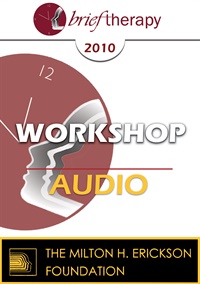
- Average Rating:
- Not yet rated
- Topic Areas:
- Anxiety | Children and Adolescent Therapy | Workshops | Brief Therapy
- Categories:
- Brief Therapy Conference | Brief Therapy Conference 2010
- Faculty:
- Lynn Lyons, LICSW
- Duration:
- 2:48:35
- Format:
- Audio Only
- Original Program Date:
- Dec 12, 2010
- Short Description:
- BT10 Workshop 39 - Brief Therapy for the Treatment of Anxious Children - Lynn Lyons, LICSW Anxious children, and often their parents, engage in predictable cognitive processes and coping strategies that create a cycle of avoidance, social isolation, and depression. This workshop will identify these common patterns, and focus on the development of interventions that help shift the anxious family toward flexibility, creativity, and the tolerance of uncertainty.
- Price:
- $15.00 - Base Price
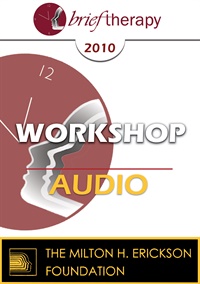
- Average Rating:
- Not yet rated
- Topic Areas:
- Workshops | Brief Therapy
- Categories:
- Brief Therapy Conference | Brief Therapy Conference 2010
- Faculty:
- Wendel Ray, PhD
- Duration:
- 2:09:34
- Format:
- Audio Only
- Original Program Date:
- Dec 12, 2010
- Short Description:
- This workshop explores the principles of MRI brief therapy, emphasizing systemic thinking, client-centered language, and therapist accountability. It covers key figures like Don Jackson, Gregory Bateson, and Milton Erickson, highlighting minimalism, small changes, and avoiding diagnostic labels. Discussions include John Weakland and Richard Fisch’s Competency-Based Brief Therapy, focusing on initial client engagement and problem definition. Practical examples illustrate subtle interventions and the importance of aligning with clients' perspectives to facilitate change.
- Price:
- $15.00 - Base Price
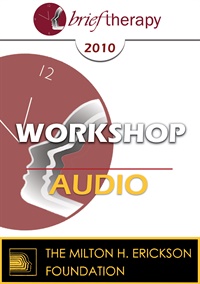
- Average Rating:
- Not yet rated
- Topic Areas:
- Psychotherapy | Workshops | Single-Session | Brief Therapy
- Categories:
- Brief Therapy Conference | Brief Therapy Conference 2010
- Faculty:
- Michael Hoyt, PhD
- Duration:
- 2:03:07
- Format:
- Audio Only
- Original Program Date:
- Dec 12, 2010
- Short Description:
- BT10 Workshop 42 - Single-Session Psychotherapy: Enhancing One-Meeting Potentials - Michael Hoyt, PhD Many therapies involve brief lengths of treatment. A structure will be presented for organizing the tasks and skills involved in different phases (pre, early, middle, late, and follow-through) of therapy. Numerous case examples, including video, will illustrate brief therapy techniques both in initial sessions and in the course of longer treatments.
- Price:
- $15.00 - Base Price
Tags: Single Session
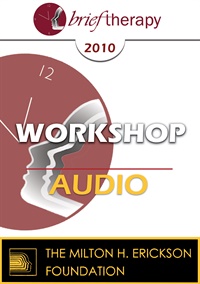
- Average Rating:
- Not yet rated
- Topic Areas:
- Workshops | Metaphors | Brief Therapy | Creativity in Therapy
- Categories:
- Brief Therapy Conference | Brief Therapy Conference 2010
- Faculty:
- Steve Andreas, MA, NLP
- Duration:
- 1:44:10
- Format:
- Audio Only
- Original Program Date:
- Dec 12, 2010
- Short Description:
- This workshop offers a hands-on way of working with stuckness through clients’ own metaphors of movement, space, and direction. By carefully exploring sensory detail and letting solutions emerge from within the image itself, it shows how perspective, grounding, and small shifts can open new paths forward without analysis, interpretation, or advice.
- Price:
- $15.00 - Base Price
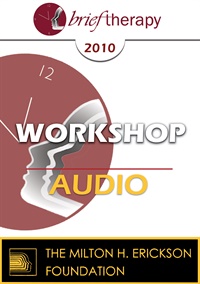
- Average Rating:
- Not yet rated
- Topic Areas:
- Meditation, Spirituality and Yoga | Workshops | Marriage | Mindfulness | Brief Therapy | Buddhism | Couples Therapy
- Categories:
- Brief Therapy Conference | Brief Therapy Conference 2010
- Faculty:
- Jon Carlson
- Duration:
- 2:51:00
- Format:
- Audio Only
- Original Program Date:
- Dec 12, 2010
- Short Description:
- Mindfulness is a deceptively simple way of relating to experience that has been successfully practiced for over 2500 years to alleviate human suffering and to increase awareness. Recently clinicians are discovering that mindfulness holds great promise as an add-on to couples therapy and education leading to greater kindness, love and acceptance. This program will discuss, demonstrate and offer experiential activities on how mindfulness can facilitate brief changes when working with couples.
- Price:
- $15.00 - Base Price
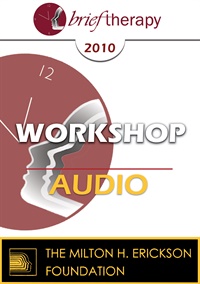
- Average Rating:
- Not yet rated
- Topic Areas:
- Psychotherapy | Workshops | LGBTQ | Brief Therapy
- Categories:
- Brief Therapy Conference | Brief Therapy Conference 2010
- Faculty:
- Rick Miller, MSW
- Duration:
- 2:27:04
- Format:
- Audio Only
- Original Program Date:
- Dec 12, 2010
- Short Description:
- Successful brief psychotherapeutic work with gay men includes the use of clinical hypnoses as well as an accepting compassionate stance of the psychotherapist. Ego state work and positive self-representations create healing from years of internalized sham. Specific psychosocial issues for game men, core issues common in the gay male community, customized hypnosis scripts, and effective short-term treatment strategies will be discussed.
- Price:
- $15.00 - Base Price
BT12 Clinical Demonstration 01 - Increasing Impact in Experiential Psychotherapy - Jeffrey Zeig, PhD
- Average Rating:
- Not yet rated
- Topic Areas:
- Clinical Demonstrations | Psychotherapy | Experiential Therapy | Brief Therapy
- Categories:
- Brief Therapy Conference | Brief Therapy Conference 2012
- Faculty:
- Jeffrey Zeig, PhD
- Course Levels:
- Master Degree or Higher in Health-Related Field
- Duration:
- 57:46
- Format:
- Audio and Video
- Original Program Date:
- Dec 07, 2012
- Short Description:
- Psychotherapy is a symbolic drama of change, the imperative of which is: “by living this experience you will be different.” Educational Objectives: List three essentials of experiential therapy. Given a patient with a behavior problem, create an experiential treatment plan to elicit change.
- Price:
-
Sale is $29.00
price reduced from Base Price - $59.00
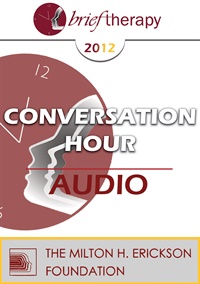
- Average Rating:
- Not yet rated
- Topic Areas:
- Conversation Hours | Therapist Development | Brief Therapy | History of Psychotherapy
- Categories:
- Brief Therapy Conference | Brief Therapy Conference 2012
- Faculty:
- Erving Polster, PhD
- Duration:
- 58:34
- Format:
- Audio Only
- Original Program Date:
- Dec 07, 2012
- Short Description:
- BT12 Conversation Hour 04 - Key Changes in Perspective over a 70-Year Career - Erving Polster, PhD Educational Objectives: Learn the philosophies of various practitioners and theorists.
- Price:
- $15.00 - Base Price
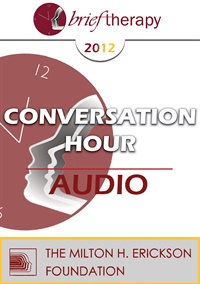
- Average Rating:
- Not yet rated
- Topic Areas:
- Couples Therapy | Hypnosis | Conversation Hours | Metaphors | Brief Therapy
- Categories:
- Brief Therapy Conference | Brief Therapy Conference 2012
- Faculty:
- Wendel Ray, PhD
- Duration:
- 52:29
- Format:
- Audio Only
- Original Program Date:
- Dec 07, 2012
- Short Description:
- BT12 Conversation Hour 11 – 1956 Flashback: Hypnosis, Paradox, Metaphorical Tasks & The Invention of Brief Couples Therapy – Wendel Ray, PhD Educational Objectives: Learn the philosophies of various practitioners and theorists.
- Price:
- $15.00 - Base Price
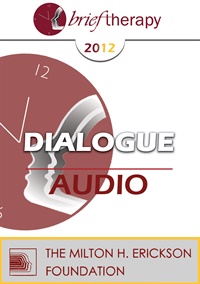
- Average Rating:
- Not yet rated
- Topic Areas:
- Dialogues | Brief Therapy | Humor
- Categories:
- Brief Therapy Conference | Brief Therapy Conference 2012
- Faculty:
- Steve Andreas, MA, NLP | Michael Hoyt, PhD
- Duration:
- 58:10
- Format:
- Audio Only
- Original Program Date:
- Dec 07, 2012
- Short Description:
- This dialogue explores how humor can loosen rigid meanings and open space for change in brief therapy. Through stories, jokes, and clinical reflection, it shows how timing, tact, and playfulness can shift perspective, strengthen alliance, and invite movement when clients feel stuck, overwhelmed, or overly serious about their problems.
- Price:
- $15.00 - Base Price
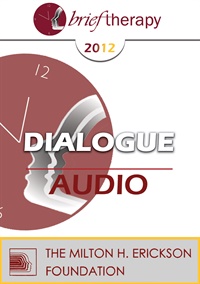
- Average Rating:
- Not yet rated
- Topic Areas:
- Dialogues | Brief Therapy | Children and Adolescent Therapy
- Categories:
- Brief Therapy Conference | Brief Therapy Conference 2012
- Faculty:
- Lynn Lyons, LICSW | Kenneth Hardy, PhD
- Duration:
- 56:40
- Format:
- Audio Only
- Original Program Date:
- Dec 07, 2012
- Short Description:
- BT12 Dialogue 11 - Brief Therapy with Children and Adolescents - Kenneth V. Hardy, PhD, Lynn Lyons, MSW Educational Objectives: Given a topic, describe the differing approaches to psychotherapy, and identify the strengths and weaknesses of each approach.
- Price:
- $15.00 - Base Price
Tags: Children Adolescents
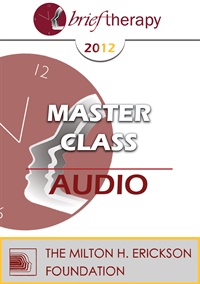
- Average Rating:
- Not yet rated
- Topic Areas:
- Master Classes | Brief Therapy | Experiential Therapy | Gestalt | Hypnosis | Hypnotherapy | Psychotherapy | Ericksonian Hypnosis and Therapy Techniques
- Categories:
- Brief Therapy Conference | Brief Therapy Conference 2012
- Faculty:
- Jeffrey Zeig, PhD | Erving Polster, PhD
- Duration:
- 2:44:44
- Format:
- Audio Only
- Original Program Date:
- Dec 10, 2012
- Short Description:
- Gestalt therapy and Ericksonian hypnotherapy are experiential methods of change. In combination they can be synergistic. Psychotherapy is best when clients have first-hand experience of an alive therapeutic process. Such dynamic empowering experiences pave the way for dynamic understandings. Drs. Polster and Zeig will engage with each other and participants to examine commonalities and differences in their work in this engaging all-day workshop.
- Price:
- $15.00 - Base Price
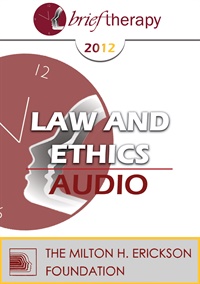
- Average Rating:
- Not yet rated
- Topic Areas:
- Master Classes | Brief Therapy | Experiential Therapy | Gestalt | Hypnosis | Ericksonian Hypnosis and Therapy Techniques | Hypnotherapy | Psychotherapy
- Categories:
- Brief Therapy Conference | Brief Therapy Conference 2012
- Faculty:
- Jeffrey Zeig, PhD | Erving Polster, PhD
- Duration:
- 2:40:44
- Format:
- Audio Only
- Original Program Date:
- Dec 10, 2012
- Short Description:
- Gestalt therapy and Ericksonian hypnotherapy are experiential methods of change. In combination they can be synergistic. Psychotherapy is best when clients have first-hand experience of an alive therapeutic process. Such dynamic empowering experiences pave the way for dynamic understandings. Drs. Polster and Zeig will engage with each other and participants to examine commonalities and differences in their work in this engaging all-day workshop.
- Price:
- $15.00 - Base Price
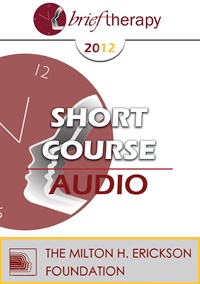
- Average Rating:
- Not yet rated
- Topic Areas:
- Short Courses | Brief Therapy | LGBTQ | Hypnosis | Sex and Sexuality
- Categories:
- Brief Therapy Conference | Brief Therapy Conference 2012
- Faculty:
- Rick Miller, MSW
- Duration:
- 1:22:15
- Format:
- Audio Only
- Original Program Date:
- Dec 05, 2012
- Short Description:
- Successful brief psychotherapeutic work with gay men includes the use of clinical hypnoses as well as an accepting compassionate stance of the psychotherapist. Ego-state work and positive self-representations create healing from years of internalized shame. Specific psychosocial issues for gay men, core issues common in the gay male community, customized hypnoses scripts, and effective short-term treatment strategies will be discussed.
- Price:
- $15.00 - Base Price
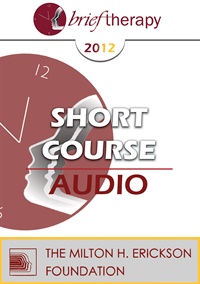
- Average Rating:
- Not yet rated
- Topic Areas:
- Short Courses | Brief Therapy | Solution Oriented Approach | Storytelling
- Categories:
- Brief Therapy Conference | Brief Therapy Conference 2012
- Faculty:
- Miguel Fernandez, PhD
- Duration:
- 1:25:42
- Format:
- Audio Only
- Original Program Date:
- Dec 05, 2012
- Short Description:
- It is the purpose of this short course to introduce and apply the concepts of both Narrative Therapy (NT) and Solution Focus Brief Therapy (SFBT) simultaneously in a therapeutic setting. The use of imagery and symbolism take the “storied” nature of problems and link them to the tapestry of all stories that a client brings into therapy. The Miracle Question looks at the “preferred view” of the problem and differentiates the singular vista of the problem against the preferred view of the client that has the vistas of the tapestry. EARS is used to give the client control over the preferred view of the problem.
- Price:
- $15.00 - Base Price
Tags: Brief Therapy Storytelling
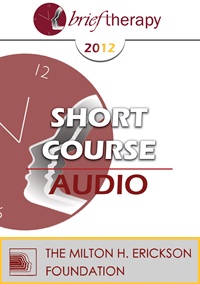
- Average Rating:
- Not yet rated
- Topic Areas:
- Short Courses | Improvisation | Abuse | Brief Therapy
- Categories:
- Brief Therapy Conference | Brief Therapy Conference 2012
- Faculty:
- Claudia Weinspach, Dipl. Psych
- Duration:
- 1:32:41
- Format:
- Audio Only
- Original Program Date:
- Dec 05, 2012
- Short Description:
- BT12 Short Course 19 – Applying Sensory Body Work and Improvisational Theater for Sexual Abuse Survivors in Brief Therapy – Claudia Weinspach, Dipl, Psych The utilization of body work and improvisational theater can be employed for different therapeutic purposes. In a therapy group with sexually abused survivors it is a useful tool in the tradition of Ericksonian therapy. Since sensory body work and improvisational theater elements are excellent tools to absorb the patients’ attention in an equally structured and playful way, they become actors and creators of their new body experience. This is an experiential workshop.
- Price:
- $15.00 - Base Price
Tags: Experiential Mind-Body
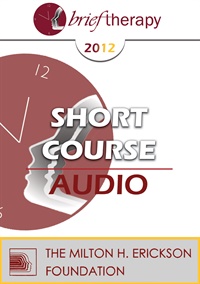
- Average Rating:
- Not yet rated
- Topic Areas:
- Trance | Trauma | Short Courses | Mindfulness | Brief Therapy | Ericksonian Hypnosis and Therapy Techniques
- Categories:
- Brief Therapy Conference | Brief Therapy Conference 2012
- Faculty:
- Ronald Alexander, PhD
- Duration:
- 1:29:32
- Format:
- Audio Only
- Original Program Date:
- Dec 09, 2012
- Short Description:
- This short course gives clinicians a hands-on look at using mindfulness and hypnotic awareness to settle agitation and restore clarity. Through live exercises and rapid grounding methods, participants see how breath, sensory focus and gentle redirection can interrupt overstimulation and help clients find steadier internal footing. The session centers on practical skills that translate easily to brief sessions or crisis moments.
- Price:
- $15.00 - Base Price
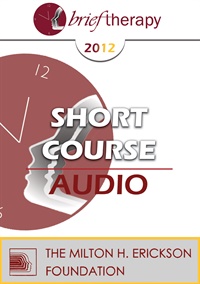
- Average Rating:
- Not yet rated
- Topic Areas:
- Short Courses | Brief Therapy | Research
- Categories:
- Brief Therapy Conference | Brief Therapy Conference 2012
- Faculty:
- Eva Long
- Duration:
- 1:18:46
- Format:
- Audio Only
- Original Program Date:
- Dec 09, 2012
- Short Description:
- BT12 Short Course 31 – Sustaining Passion and Longevity in Life Using Medical and Longevity Research and Theories in Brief Therapy – Eva Long, PhD This is a fast-paced, proven successful workshop on how professionals will help patients and clients utilizing the current adult development research/best practices in meaningful work/self-renewal with practical implementation ideas. This session will focus on the importance of 1) creating a life’s purpose, 2) optimism, 3) a circle of friends, 4) managing loss, and letting go while connecting the dots on some of the most significant medical and longevity research.
- Price:
- $15.00 - Base Price
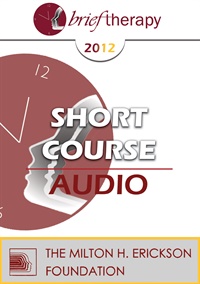
- Average Rating:
- Not yet rated
- Topic Areas:
- Short Courses | Brief Therapy | Subliminal Therapy | Unconscious Processes
- Categories:
- Brief Therapy Conference | Brief Therapy Conference 2012
- Faculty:
- Edwin Yager, PhD
- Duration:
- 1:23:45
- Format:
- Audio Only
- Original Program Date:
- Dec 09, 2012
- Short Description:
- Subliminal Therapy is an innovative and easily-learned, psychodynamic technique for use in clinical settings. The theory, rationale and application are presented in this workshop, including compelling data on efficacy as derived from patient-completed, pre- and post-treatment inventories. The workshop addresses application of ST to both psychological and psychogenic medical problems.
- Price:
- $15.00 - Base Price
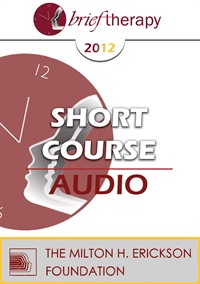
- Average Rating:
- Not yet rated
- Topic Areas:
- Short Courses | Brief Therapy | Reality Therapy | Solution Oriented Approach
- Categories:
- Brief Therapy Conference | Brief Therapy Conference 2012
- Faculty:
- Robert Wubbolding, EdD
- Duration:
- 1:28:30
- Format:
- Audio Only
- Original Program Date:
- Dec 09, 2012
- Short Description:
- BT12 Short Course 33 – Brief Reality Therapy: Present, Accountable, and Solution-Focused – Robert Wubbolding, EdD Simulated role-play demonstrations, the focus of this session, illustrate the practical use of the WDEP system of reality therapy. Client self-evaluation, the core of reality therapy, as well as the incorporation of several Ericksonian principles such as utilization, are highlighted. Participants will gain information about research studies validating the use of reality therapy as well as practical and innovative ideas immediately useful on the job. Handouts suitable for photocopying will be provided.
- Price:
- $15.00 - Base Price
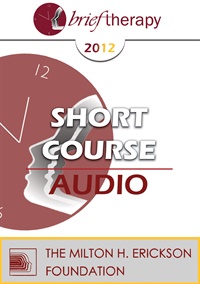
- Average Rating:
- Not yet rated
- Topic Areas:
- Short Courses | Borderline | Brief Therapy
- Categories:
- Brief Therapy Conference | Brief Therapy Conference 2012
- Faculty:
- John Lentz, D. Min.
- Duration:
- 1:29:05
- Format:
- Audio Only
- Original Program Date:
- Dec 09, 2012
- Short Description:
- BT12 Short Course 36 – New Perspectives and Healing for Borderlines: A Brief Therapy Intervention for Lasting Change – John Lentz, DMin This radical new approach for Borderline Personality Disorder utilizes strength based approaches that work, are respectful and brief. Combining clinical practice, communication theory and hypnotic principles this approach helps Borderlines feel safe and respected, while they change. Utilizing Borderline intuition, and insight it offers a way for them to gently alter their interpretations so that they can relate effectively and safely. You will like your new skills. This workshop comes from the author’s newest book.
- Price:
- $15.00 - Base Price
Tags: Borderline
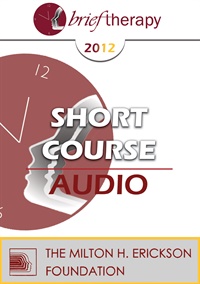
- Average Rating:
- Not yet rated
- Topic Areas:
- Animal Assisted Therapy | Psychotherapy | Short Courses | Metaphors | Brief Therapy
- Categories:
- Brief Therapy Conference | Brief Therapy Conference 2012
- Faculty:
- Dale Klein-Kennedy, LPCC | Karen Wall
- Duration:
- 1:07:50
- Format:
- Audio Only
- Original Program Date:
- Dec 09, 2012
- Short Description:
- Animal metaphors are used as a part of our everyday vocabulary describing relationships, personal characteristics, etc. Metaphor in the presence of the work with the animal takes on a new and deeper meaning. This presentation will demonstrate the powerful use of animals and animal metaphors in brief psychotherapy. Through examples and discussion of the work, attendees will develop an understanding of ATT (animal-assisted therapy) and will participate in a live demonstration of AAT.
- Price:
- $15.00 - Base Price
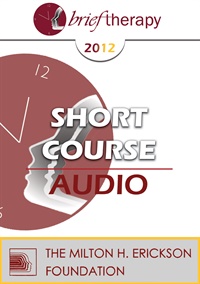
- Average Rating:
- Not yet rated
- Topic Areas:
- Hypnosis | Short Courses | Metaphors | Brief Therapy
- Categories:
- Brief Therapy Conference | Brief Therapy Conference 2012
- Faculty:
- Bette Freedson, MSW
- Duration:
- 1:14:37
- Format:
- Audio Only
- Original Program Date:
- Dec 09, 2012
- Short Description:
- Therapists working with single mothers often hear stories of abandonment, disempowerment, loneliness, hopelessness, victimization, rage and unrelenting stress. Disturbing perceptions and emotions such as these, and the distorted interpretations that result, may rigidify into psychic schemas comprised of patterns of dysfunctional reacting and compromised coping. Identifying negative schemas, and harnessing the mind’s powerful potential to transform them, will be the dual focus of this course. Participants will explore the way in which the quiet mind, combined with the evocative and rhythmic language of hypnosis, can fuel a subconscious shift from confusion to clarity. Participants will experience the way in which sympathetic identification with transformed metaphors, drawn from the substance of personal stories, can fuel an alchemical shift that decreases stress, increases ego strength, and paves the way to inner peace.
- Price:
- $15.00 - Base Price
Tags: Hypnosis Brief Therapy Metaphors
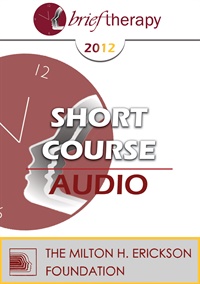
- Average Rating:
- Not yet rated
- Topic Areas:
- Short Courses | Brief Therapy | Footprinting | Relationships
- Categories:
- Brief Therapy Conference | Brief Therapy Conference 2012
- Faculty:
- Susan Dowell, MSW
- Duration:
- 1:03:35
- Format:
- Audio Only
- Original Program Date:
- Dec 09, 2012
- Short Description:
- Footprintings is a new three dimensional treatment model. In this work, nine different color sets of Footprintings become tools for a patient to bookmark, diagram, track and explore internal experience and shifting states of consciousness, as they are experienced in the Present Moment. When a patient chooses color Footprintings to represent an aspect of self-experience, positions these Footprintings on the ground and then stands in them, the postural shifts , body experience, and shifting perspectives and associations unfolding from this positioning can lead to valuable insights, learning opportunities and new perspectives.
- Price:
- $15.00 - Base Price
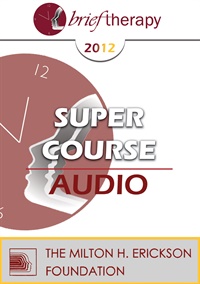
- Average Rating:
- Not yet rated
- Topic Areas:
- Depression | Hypnosis | Super Courses | Experiential Therapy | Mindfulness | Brief Therapy
- Categories:
- Brief Therapy Conference | Brief Therapy Conference 2012
- Faculty:
- Michael Yapko, PhD
- Duration:
- 4:42:27
- Format:
- Audio Only
- Original Program Date:
- Dec 09, 2012
- Short Description:
- The cutting edge of rapidly expanding scientific evidence highlights that the more we learn about the biology of depression, the more important psychology and social experiences become in shaping recovery on all levels. Participants will learn to utilize therapy as a social process that can teach clients skills experientially in order to reduce and even prevent depression. Interventions involving skill building homework assignments, and experiential methods of hypnosis and mindfulness will be considered in depth through group hypnosis and at least one skill-building exercise.
- Price:
- $15.00 - Base Price


